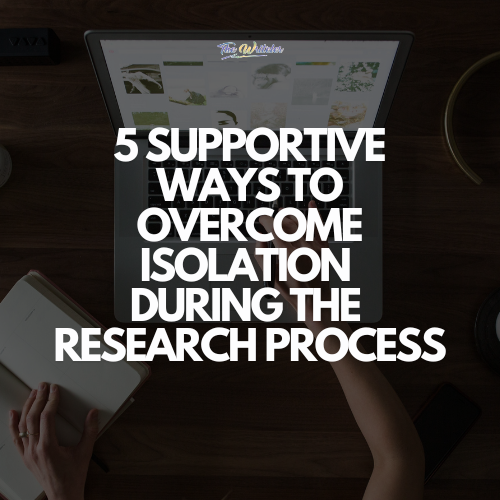The research process can often feel like a solitary journey, leading to feelings of isolation. However, there are several strategies and exercises you can practice to stay connected and maintain your well-being. Here are some tips to help you overcome these feelings:
1. Build a Support Network
Creating a network of peers, mentors, and colleagues can provide invaluable emotional and academic support.
- Join Research Groups: Participate in study groups or research seminars where you can share ideas and receive feedback.
- Attend Conferences: Engage with the academic community by attending conferences and workshops, even virtually.
- Connect Online: Use platforms like LinkedIn or ResearchGate to connect with researchers in your field.
Exercises:
- Weekly Check-ins: Schedule regular meetings with peers to discuss progress and challenges.
- Discussion Forums: Participate in online forums related to your research area to exchange ideas.
2. Establish a Routine
Having a structured routine can provide stability and a sense of control, reducing feelings of isolation.
- Set Daily Goals: Break down your research tasks into daily goals to maintain focus and motivation.
- Incorporate Breaks: Ensure you take regular breaks to refresh your mind and prevent burnout.
Exercises:
- Time Blocking: Allocate specific time slots for different tasks, including leisure activities.
- Mindfulness Practices: Incorporate meditation or deep-breathing exercises into your routine to manage stress.
3. Engage in Physical Activity
Physical activity can boost your mood and help combat feelings of loneliness.
- Join a Class: Participate in group fitness classes or sports teams to meet new people.
- Outdoor Activities: Spend time outdoors, whether it’s walking, jogging, or cycling, to improve your mental well-being.
Exercises:
- Daily Walks: Take a 30-minute walk each day to clear your mind and connect with nature.
- Yoga or Pilates: Practice yoga or pilates to enhance physical and mental health.
4. Seek Professional Help
If feelings of isolation persist, consider seeking professional support.
- Counseling Services: Many universities offer counseling services for students experiencing mental health challenges.
- Therapy: Engage with a therapist to explore underlying issues and develop coping strategies.
Exercises:
- Journaling: Write about your feelings and experiences to process emotions and gain clarity.
- Support Groups: Join support groups where you can share experiences with others facing similar challenges.
5. Hire a Research Writer
If the research process becomes overwhelming, hiring a research writer can provide relief and reduce isolation.
- Collaborative Work: Working with a research writer can provide a sense of partnership and shared responsibility. You can check The Writeler Co. and Acad Service Pro if you need help.
- Expert Guidance: Benefit from the expertise and insights of a professional to enhance your research quality.
Exercises:
- Regular Meetings: Schedule regular meetings with your research writer to discuss progress and strategies.
- Feedback Sessions: Use feedback sessions to refine your work and build confidence in your research abilities.
Implementing these strategies helps you overcome feelings of isolation and foster a more connected and fulfilling research experience. Remember, reaching out for support is a strength, not a weakness.
For more informative blogs and insights into the research process, visit The Writeler Co. Our platform offers a wealth of resources and expert guidance to help you navigate the complexities of academic research. Whether you’re a novice researcher or an experienced scholar, our content is designed to enhance your understanding and skills. Explore our articles, tutorials, and previous works to stay informed and elevate your research journey.





Your article helped me a lot, is there any more related content? Thanks!
Thank you! Do you have any contents that you wish to read?